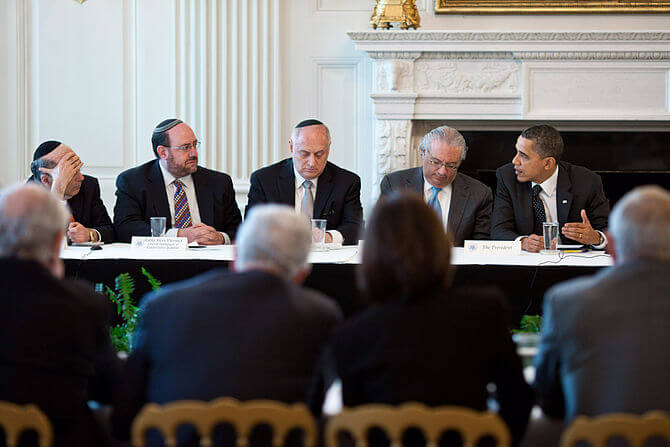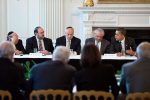President Trump’s Audacity for Action
President Trump’s decision killed the two-state solution and the MENA doctrine (Realpolitik) of the former Presidents H.W Bush and Bill Clinton.
By Abdennour Toumi
Eight years ago the political pundits and the rejectionist politicians made the story of then-President Obama’s first year in the White House sound like American voters hired a one-year President. The comments had been going unfairly out of context.
Though he ran a campaign that inspired millions to join his caravan for “change” and hope, some of his followers wouldn’t dare admit he was a politician because they were seeing him as an acolyte of the Dalai Lama, if not more.
Recall during the heated campaign season 2007-2008 during the primaries in New Hampshire, how Senator Clinton, his then-challenger for the post, contemptuously ridiculed his followers, saying, “the skies will open, the light will come down, celestial choirs will be singing and everyone will know we should do the right thing and the world will be perfect…”
Guess what, recent American voters elected a businessman, an unconventional politician who knows the world is complicated and far from perfect; on the contrary, what his opponents in the U.S. and abroad think, he is an ignorant player — he masters the art of politics without reading The Prince, nor the Art of War.

Hence, President Trump promised to change Washington, D.C. (“drain the swamp”) and bring the power to the people; nonetheless, elections are the means and not the end, but in President Trump’s world, elections are the end.
One tends to forget that President Trump was elected as the anti-thesis to the liberals, the Clintons and the Obamas alike. The country was politically divided and America is not just New York City and San Francisco. President Trump told America and the world that he would turn the page of the Obama administration policies. He tried to repeal Obama care and build a beautiful wall on the U.S.-Mexican border; on the Middle East front, he boldly acted and decided to move the U.S. Embassy from Tel-Aviv to Jerusalem.
Yet his Middle East foreign policy is a giant-step diplomacy; he dismantled ISO from Iraq and Syria, but brought it to Sinai. He destabilized the Gulf countries, lost the trust of Ankara, and now the world leaders are nervous about his Iran nuclear deal, the P5+1.
The speed rate in the process of President Trump’s actions has created an emotional reaction to his audacity in the camp of his haters in the U.S. and in the world, notably in the Middle East.
However, in the eyes of the Muslim and Arab worlds, he looks like President G.W. Bush with a sharp baton in his right hand. President Trump has promised to relaunch the tiring peace process, but in the wake of his last night’s decision, there is neither process nor progress. He just killed the ambulance driver and then bombed the ER of the hospital.
He is not mentioning the infamous phrase of “War on Terror,” which former President Obama changed to “Overseas Contingency Operation.” Nevertheless, in the light of the attempt to combat terror, President Trump has been issuing profiling rules on travelers from Muslim and Arab countries.
“Change” in politics is a rhetorical electoral slogan. Former President Obama is an excellent orator and storyteller. Theoretically he deceived in particular the left wing of the Democratic party and the idealists abroad alike. Many people, including the Nobel Prize Committee, had a sort of idea fixe, an obsession, about the charisma that he generated during the campaign, which let them dream that change would come.
Coincidently President Trump has commenced his first year with the Republican leaders in the House and Senate feeling stronger about their “no” attitude; the passive Democratic senators and congressmen are in a panic mode in light of Senator Al Franken’s and Congressman John Conyer’s sexual misconduct allegations. President Trump’s first year in office hasn’t disappointed his evangelical base who believe in God-given rights, and has certainly pleased his donors and strong Jewish lobbies in D.C.
From the core of the political scenario all the promises that have been implemented are also wagging the dog, diverting attention from the General Flynn scandals that could prove to be President Trump’s “Russia Gate.”
If Senator (then candidate) Obama believed Jerusalem was the undivided capital of Israel in his speech before the AIPAC (American Israeli Public Affairs Committee), a bi-partisan orthodox Jewish lobby in Washington, D.C., then President Trump’s turning-point decision in the role of the U.S. in the Palestinian-Israeli conflict is what every U.S. President believed, but did not dare act upon.
President Trump’s decision killed the two-state solution and the MENA doctrine (Realpolitik) of the former Presidents H.W Bush and Bill Clinton.
President Trump’s bully MENA foreign policy is idealistically tackling the complex subject from the angle of local politics with electoral votes at stake, ignoring that the policy’s evolution has to be subjected to the political culture of his public policy trajectory and not the establishment and the think-tanks in Washington, D.C. toward Middle Eastern dynamics. Why? because President Trump thinks tank first.
Once again, the dichotomy of domestic-foreign policies is used as a tactical instrument to direct the foreign policy of leaders in the current turbulent period. President Trump is already thinking ahead to the 2020 re-election; for that he will need the Jewish vote in the swing States, this time in blue States and the evangelists in the south.
The failure of the U.S. foreign policy in the Middle East under former Bush President and Barrack Obama led to multiple factors challenging the U.S. foreign policy. New supranational actors emerged as a serious threat to the conventional states. For instance, ISO and its franchise in the Maghreb and Europe have provoked an academic rejection in the political scientists’ milieu of the classic definition of the inter-States system, the Westphalian order.
On the other hand, the return of geo-politics in the region post-Arab Spring has found a legitimate approach following the emergence of conflicts there. President Trump’s Middle East (Riyalpolitik) doctrine seems to be taking those challenges and dealing with them separately — whether facing the Palestinian-Israeli conflict or Syria, Libya, Yemen, the Gulf monarchies crisis and eventually Iran. How will the U.S. handle this?


- The Israeli-Palestinian Conflict: Is the Neither-Peace-nor-Security As-sumption Dominating Again? - June 7, 2021
- Algeria: “I Can See Clearly Now” - August 5, 2019
- Majesty Mohammed VI and General Gaïd Salah Tear Down This Wall! - July 29, 2019






















